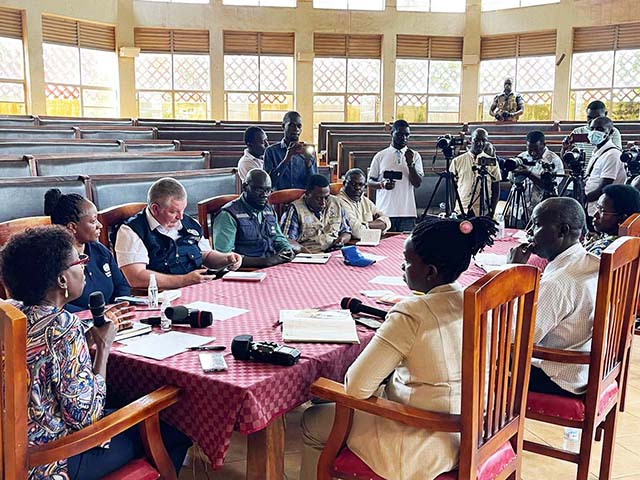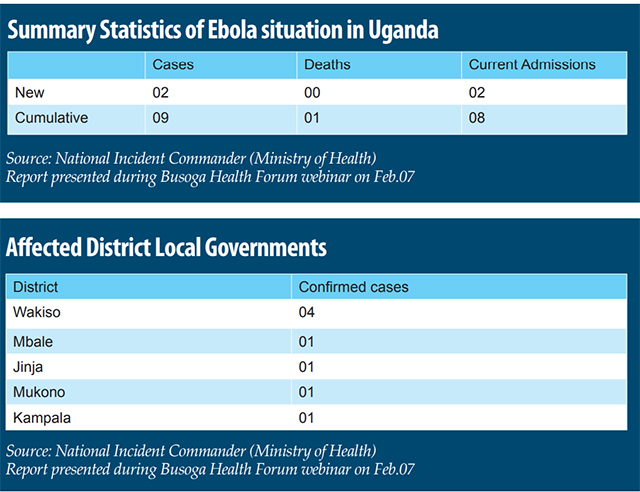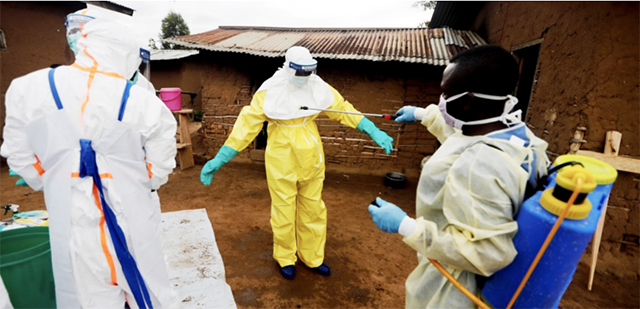
Why Health Minister Aceng is ‘quiet’ on numbers
COVER STORY | RONALD MUSOKE | Uganda is in the midst of yet another episode of the hemorrhagic fever Ebola following a Jan.30 announcement by Dr. Diana Atwine, the Ministry of Health’s Permanent Secretary.
In a hastily arranged press conference in the afternoon of Jan.30, Dr. Atwine said the confirmed case, known as the index case, was that of a 32-year-old male nurse who was working at Mulago—Uganda’s National Referral Hospital.
The confirmation of Sudan Ebola Virus Disease, the eighth outbreak in 25 years, followed tests done at three national reference laboratories; the Central Public Health Laboratory in Kampala, the Uganda Virus Research Institute in Entebbe and Makerere University.
As usually happens when such highly infectious diseases break out in the country, the government relies on the media to rally communities to control the spread of infection. That was emphasised again during a recent visit to Mbale city where Dr. Jane Ruth Aceng had travelled to chair the National Ebola Task Force meeting on Feb 05.
“Our being here in Mbale is not about the government system of preparedness, because the government system exists but our being here is to empower you people (the media) with information; it is to tell you that you need to engage more with the communities, it is to keep you vigilant and alert, it is to emphasise the fact (that) we must work in solidarity to bring this outbreak under control,” Dr. Aceng said.
But when Dr Aceng was asked by the media to share more specific data of Ebola-related cases (contacts of people who had interacted with the index case, those isolated and those undergoing treatment), Dr. Aceng appeared determined not to offer additional information.
She said numbers were not all that important to the media.
“What I want you the press to know is that we shall be giving updates every two weeks, not every day. So don’t ask us about cases or whatever; that is not important. What’s important is that you get to the communities and tell them they need to protect themselves and they need to pass on information,” she said.
The journalist request for details was valid because the only update about the current episode of Ebola in Uganda had been issued on Feb.02 when the Ministry of Health noted that 234 people had been listed as contacts of the nurse who succumbed to the disease. From that number, two people (the deceased’s wife and child) were found to be infected with the disease and were receiving treatment at the Ebola Treatment Unit in Kampala.
It’s not clear why Dr. Aceng, who since her first appointment as Minister of Health in 2016 has often issued clear statements in regards to epidemic control and prevention, appeared set to withhold information.
Clear information needed
Whatever her motivation, independent public health experts say, when virulent epidemics like Ebola break out, clear information is a prerequisite in controlling the disease. In Uganda’s case, this is even more of the essence considering how widespread misinformation and disinformation is.
Dr. Aceng’s withholding of latest information on the disease spread appears to be new Ministry of Health policy. On Feb.02, Emmanuel Ainebyona, the Ministry of Health spokesperson warned bloggers against spreading false information about Ebola which is causing unnecessary anxiety to the public. He said there are people who have made it a habit of alarming the population with false information regarding the number of people of those affected.

The result of the Ministry of Health stonewalling is that the general public appears unaware of the danger lurking near them. In Mbale City which has been linked to the index case, a source who spoke to The Independent on Feb.07 said “life is as normal as before the outbreak was announced by the Ministry of Health on Jan.30”.
“People are going about their work normally,” the source said.
Meanwhile, in the absence of official information, disinformation has been spreading. The Independent’s source said there was a report from Namisindwa District about a person who was suspected to have died of Ebola but tests were done and it turned out he died of TB.
Days earlier there had been a scare at Mbale Regional Hospital when a woman who had exhibited Ebola-like symptoms died at the gate. But Asumin Nasike, Chairperson of the Mbale City Ebola Response Committee, also Mbale Resident City Commissioner said tests done were negative for Ebola. They confirmed she died from tuberculosis (TB).
Dr. Peter Waiswa, an Associate Professor at Makerere University School of Public Health suspects the fear of the impact on the economy amidst the ongoing winds of change in global politics could be responsible for the sudden change in attitude of the government.
“I think they don’t want to scare people, especially tourists,” he told The Independent.
Prof. Waiswa insists it’s important for the people in the communities to get to know about the cases as that might help to raise perceived risk of the current outbreak.
Prof. Waiswa told The Independent that the fact that the current outbreak is in the densely populated capital can only imply that if the disease is mismanaged, it could spread easily and quickly.
When Dr Aceng was asked whether Uganda was open to tourism, trade and travel, she said since the outbreak is confined to well-defined areas in Kampala, the country’s bustling capital, and Mbale city, all measures have been taken to control and prevent spread to other parts of the country.
“Even when we have an outbreak, we don’t restrict tourism, trade and travel. In any case, the outbreak is in well-defined areas. It’s not widespread all over the country,” Dr. Aceng said, “Uganda is very safe. We encourage all tourists to come to Uganda. We encourage trade and we encourage travel. There is no threat of Ebola anywhere the tourist will go.”
An epidemiologist who preferred to speak anonymously said the current stance adopted by the government has not been associated with Uganda.
We know that it has been more of a practice of our neighbouring countries and for them; it has always been about protecting their economies,” the expert told The Independent. “But we know that it is not good practice,” he said.
In the Mbale meeting, Dr. Mike Ryan, the Deputy Director General of the WHO said the UN health agency he too was in support of business and tourism in Uganda continuing because the government is aware of the problem and it is managing the problem to the very end.
“I am very convinced that Uganda is very aware of the problem; it has communicated the problem with the international partners and it has plans developed over many years to end the problem.”
Dr. Ryan who was part of the team that contained the country’s first ever Ebola outbreak in the northern Uganda city of Gulu 25 years ago noted that “Uganda is a massive contributor to global health security and when Uganda faces an issue like Ebola, we come because Ugandans are our bosses.”
“As health workers we are here to supplement the efforts of the local health personnel. Uganda is a member state of the World Health Organisation and this is not charity; it is not about helping Uganda.”
When Uganda last battled the Ebola disease in 2022, President Yoweri Museveni and Dr Aceng led an aggressive public sensitisation campaign.
They directed responsible government agencies to intensify public health awareness after fully understanding community issues, culture and tradition.
The Ministry of Health also intensified surveillance and contact tracing in the two “ground-zero” districts of Mubende and Kassanda to pick out all possible cases.
But even with the goodwill from the international community, there were times when the government appeared to be losing the battle against the disease thanks to lack of cooperation from the public due to negative talk, myths and misconceptions about Ebola.
On October 15, 2022, during his regular addresses on the Ebola situation, President Museveni locked down Mubende and Kassanda districts for 21 days with movements in and out of the two districts restricted.
President Museveni said at the time that the government had taken the drastic decision because people had become difficult, were lying to authorities, hijacking dead bodies and moving from district to district, including coming to the capital.
The deceit, Museveni said, had not changed and the risk of spreading Ebola to other parts of the country remained very high. Weakly flea markets were suspended, places of worship, entertainment centres (bars, video halls, fitness centres were temporarily closed) but gold mines and schools were allowed to continue.
Museveni said his directive on restricted movement was based on optimizing control efforts in the same geographical area and minimizing spread to other areas.
“Ebola, as you know, is highly infectious and deadly, if not adequately controlled, Ebola may spread beyond Uganda,” Museveni said.

Feel good messaging
At the time, The Independent ran a story titled `Fighting Ebola ‘quietly: Health Minister Aceng’s recipe for success or failure?’ (see: The Independent October 22, 2022). The story pointed at how Uganda’s Ministry of Health stressed the importance of communication and shared information via presidential speeches, television and radio broadcasts, posters, social media, and resources online where latest information was uploaded. It noted that some of these interventions have were missing in that Ebola response.
The story said emphasis was on spreading feel good information only which is the strategy that Great Lakes Safaris and Uganda Lodges CEO, Amos Wekesa, was pushing then and now.
Amos Wekesa was in 2015 appointed to the global ‘Africa is not Ebola’ campaign set up to spread feel good information about the continent following the West African outbreak. They argued that although Ebola has struck the continent, tourists, investors and consumers should not be scared to visit because the situation is not as grim as presented. They say such reporting hurts the economy.
The story quoted experts on how to respond to an Ebola outbreak such as Dr. Mosoka Fallah; one of those who managed the 2014/2015 Ebola outbreak in West Africa, saying getting the right information out is very important to succeeding.
“Misinformation, disinformation and rumours make response efforts difficult. It can create great hostility to response teams,” Dr. Mosoka Fallah wrote in an essay published by the online journal, The Conversation.
Dr Aceng appears to be pursuing the same strategy this time.
She told journalists in Mbale that “What is important for you to pass on is that the outbreak will be stopped by the communities; they are the only ones who can control it; it is not the government systems that you are talking about.”
Dr. Aceng said her Ministry had vehicles in place for surveillance and emergency medical services (ambulance system) that is interconnected around the country.
“The update is that we have Ebola cases in the country; they are receiving treatment and they are improving. The update is that we are still carrying out intensive surveillance to pick any case if any exists within the community and we need you to report any suspected cases on time to us. We have already set up isolation facilities for purposes of treatment. In that isolation facility, we have three separate areas for suspected cases, probable cases and confirmed cases,” Dr Aceng said.
“What’s important is for them (communities) to know that our index case passed through Mbale Regional Referral Hospital and also interacted with a few people in the communities and that is why we need the communities to be vigilant so that we can pick out the cases from the communities.”
“Outbreaks start in the communities and end in the communities and so we need the communities to rise up and be vigilant and say we don’t want Ebola in our communities and so we are going to educate one another and we are going to weed out all suspicious cases to the facilities and Ebola will end just like it ended in Kasanda and Mubende.”

Dr Aceng said the Ugandan communities are “their best asset ever.” “We appreciate them for being our best asset ever. They have been our most valuable asset. The fact that Uganda is known for controlling outbreaks on time is because of the Ugandan communities; they listen and respond.”
“They shouldn’t be alarmed; they just want them to respond in the right way; educate one another, report any suspicious case, don’t be alarmed, everything will go on well and we shall end this outbreak on time.”
Dr. Aceng appeared aware of misinformation circulating about the latest Ebola episode. She said the Ministry of Health never declares outbreaks for any political reason.
“If it was political, we would declare outbreaks every month, why not? But why should we declare outbreaks in 2022 and 2025?”
“That is not political. And we don’t declare outbreaks because we are looking for money but we need money to control an outbreak. You need resources to deploy people on the ground, for commodities, transport and you need resources to treat the sick.”
“And that’s why one of the other reasons why we declare, because when we declare, partners like the World Health Organisation WHO) will come down in solidarity and support the response; financially but also with human resource and knowledge. And then other partners will also mobilise resources within their resources.”
“We also declare outbreaks to make the communities aware that there is a challenge and you need to be vigilant. Because if we keep quiet, and for example, the index case came here, we would never know. But now if we are tracing, people in the communities are able to rise up and say the index case passed here, he was carried by this person and that helps us to pick out the contacts.”
“But also, we are bound by international health regulations to which Uganda is a significantly. We declare so that all countries are aware that we have a challenge but we are not going to export that challenge to them; we are going to control it from within. It also helps those countries neighbouring Uganda to prepare.”
Indeed, following the confirmation of the Ebola outbreak, the World Health Organisation (WHO) announced on Jan.30 that it had allocated US$1 million (Approx. 3.65 billion) from its Contingency Fund for Emergencies to help accelerate early action, and would send medical supplies, including personal protective equipment to deliver to Uganda from its Emergency Response Hub in Nairobi to support the national health authorities to swiftly contain and end the outbreak.
The WHO Africa Region office further noted that it would also deploy senior public health experts and mobilize staff from the country office to support all the key outbreak response measures.
“We welcome the prompt declaration of this outbreak, and as a comprehensive response is being established, we are supporting the government and partners to scale up measures to quicky identify cases, isolate and provide care, curb the spread of the virus and protect the population,” said Dr Matshidiso Moeti, the WHO Regional Director for Africa. “Uganda’s robust expertise in responding to public health emergencies will be crucial in ending this outbreak effectively.”
“Banking on the existing expertise, we are accelerating all efforts, including expertise, resources and tools to save lives and bring the outbreak to a halt swiftly,” said Dr Kasonde Mwinga, the newly arrived WHO Representative in Uganda.
Just like the previous outbreak which hit the central-western district of Mubende, the current outbreak has the potential to ground the economy since cases have been confirmed in Kampala which serves as both the political and commercial city of the country.
Dr. Atwine also said the index case, a nurse, had developed fever-like symptoms and sought treatment at multiple health facilities, including Mulago National Referral Hospital in Kampala, Saidina Abubakar Islamic Hospital in Matugga, a town in the northern outskirts of Kampala’s metropolis and, in Mbale, a city located about 240km east of the capital.
She said that before the patient died on Jan.29, he had presented with a five-day history of high fever, chest pain, and difficulty in breathing, which later progressed to unexplained bleeding from multiple body sites.
“The patient experienced multi-organ failure and succumbed to the illness at Mulago National Referral Hospital on 29th January 2025,” she said, adding that, “Post-mortem samples confirmed Sudan Ebola Virus Disease.”
Dr. Diana Atwine concluded her announcement by reminding Ugandans about their responsibility of safeguarding their communities.
“The responsibility of making sure that this outbreak is put under control lies with them,” she said, “They should make sure that they take extra precaution; make sure that whoever falls sick is reported and anyone who is unwell is brought to a health facility to test.”
 The Independent Uganda: You get the Truth we Pay the Price
The Independent Uganda: You get the Truth we Pay the Price


